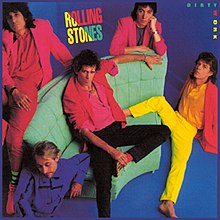Dirty Work (The Rolling Stones album)
| Dirty Work | ||||
|---|---|---|---|---|
 |
||||
| Studio album by The Rolling Stones | ||||
| Released | 24 March 1986 | |||
| Recorded | 5 April – 17 June, 16 July – 17 August 1985, 10 September - 15 October 1985 | |||
| Genre | Hard rock, pop rock | |||
| Length | 40:03 | |||
| Language | English | |||
| Label | Rolling Stones, Columbia | |||
| Producer | Steve Lillywhite, The Glimmer Twins | |||
| The Rolling Stones chronology | ||||
|
||||
| Singles from Dirty Work | ||||
|
||||
| Professional ratings | |
|---|---|
| Review scores | |
| Source | Rating |
| AllMusic | |
| Christgau's Record Guide | A |
| MusicHound | 2.5/5 |
| The Rolling Stone Album Guide | |
| Uncut | 3/5 |
Dirty Work is the Rolling Stones' 18th British and 20th American studio album. It was released on 24 March 1986 on the Rolling Stones label by CBS Records. Produced by Steve Lillywhite, the album was recorded during a period when relations between Mick Jagger and Keith Richards soured considerably, according to Richards' autobiographyLife.
The sessions for Dirty Work, the first album under the Rolling Stones' recording contract with CBS Records, began in April 1985 in Paris, running for two months before breaking for a short spell. Mick Jagger had just released his first solo album, She's the Boss (1985), much to Richards' annoyance, since the latter's first priority was the Rolling Stones and he was stung that Jagger was pursuing a career as a pop star. Jagger was often absent from the Dirty Work sessions while Richards recorded with Ronnie Wood, Bill Wyman and Charlie Watts; Jagger's vocal parts were added later on. The divide between Jagger and Richards was on public view on 13 July 1985, when Jagger performed a solo set at Live Aid while Richards and Wood supported Bob Dylan's set on acoustic guitars.
Charlie Watts' involvement in the recording sessions was also limited; in 1994 Watts told Ed Bradley on 60 Minutes that during the 1980s he had been addicted to heroin and alcohol. Steve Jordan and Anton Fig play drums on some tracks; Ronnie Wood plays drums on "Sleep Tonight". Jagger would later cite Watts' personal state as one of the reasons he vetoed a tour in support of Dirty Work in 1986, preferring to start work on his second album, Primitive Cool (1987).
...
Wikipedia
